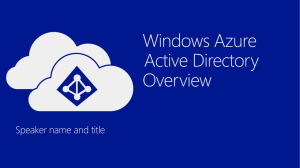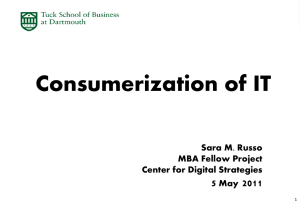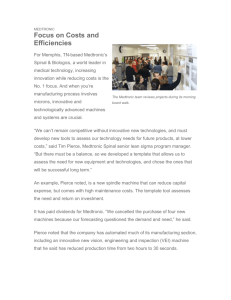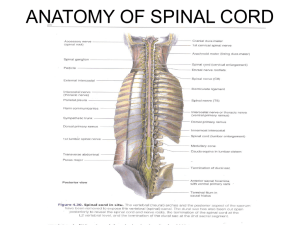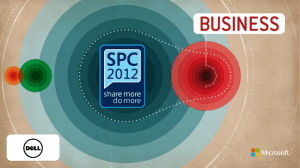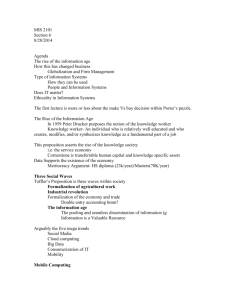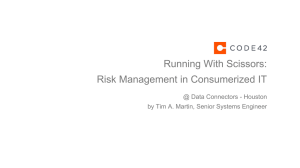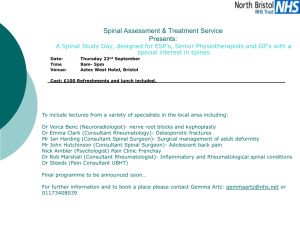The New IT Organization Disruptor: Consumerization of IT Mike Hedges
advertisement
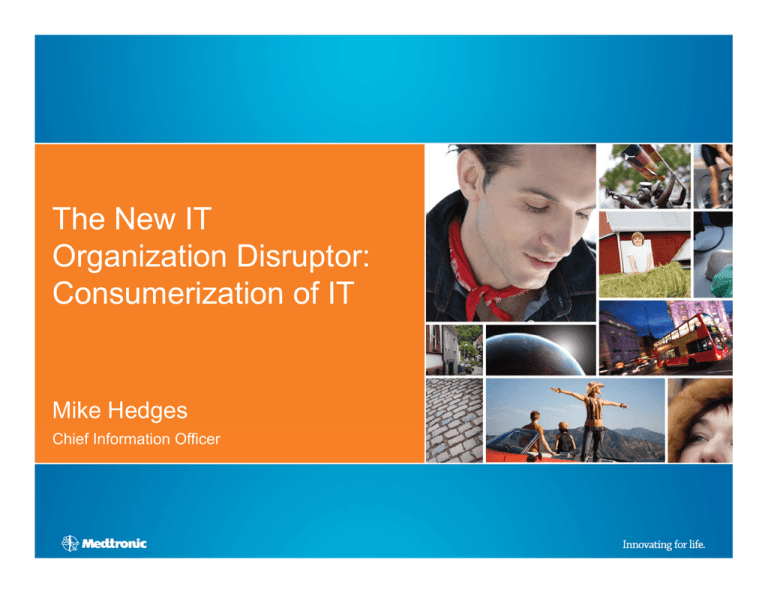
The New IT Organization Disruptor: Consumerization of IT Mike Hedges Chief Information Officer Medtronic – A Brief Introduction 1949 - Fulfilling an Unmet Medical Need An Enduring Mission To contribute to human welfare by application of biomedical engineering … To direct our growth in the areas of biomedical engineering … To strive without reserve for the greatest possible reliability… To make a fair profit … To recognize the personal worth of employees … To maintain good citizenship… Our founder Earl Bakken with medallion Global Leader in Medical Technology 45,000+ employees, making us the largest global medical technology company 9,000+ scientists and engineers around the world 2,050+ FY11 patents awarded, bringing our total worldwide to more than 23,000 $15.9B FY11 global sales which generate $3.2B in free cash flow* ~43% * Free cash flow is operating cash flow minus capital expenditures sales from international markets, representing more than 120 countries Diverse Businesses to Treat Many Conditions Diabetes CardioVascular Surgical Technologies Spinal & Biologics Neuromodulation CRDM Therapies to Address Many Chronic Conditions Hydrocephalus Sinus Diseases Sinus Augmentation Sleep Disordered Breathing Cervical Degenerative Disc Disease Thyroid Conditions Atrial Fibrillation Heart Failure Congenital Heart Disease Heart Rhythm Disorders Angina* Coronary Artery Disease Heart Valve Disease Scoliosis Spinal Fracture Lumbar Spinal Stenosis Degenerative Disc Disease Pelvic Trauma Parkinson’s Disease Epilepsy* Essential Tremor Cranial Trauma Dystonia** Brain Tumors Obsessive-Compulsive Disorder** Otologic Disorders Meniere’s Disease Aortic Disease Severe Spasticity associated with Multiple Sclerosis, Cerebral Palsy, Stroke and Spinal Cord and Brain Injuries Chronic Pain Nausea and Vomiting associated with Gastroparesis** Diabetes Overactive Bladder and Urinary Retention Fecal Incontinence Peripheral Vascular Disease* Tibial Fractures * ** Not approved for commercial distribution in the United States Humanitarian Device in the United States – the effectiveness for this use has not been demonstrated Serving the World’s Major Geographies Central/Eastern Europe Western Europe/ Canada United States Greater China Middle East/Africa Latin America Countries 120+ Asia India Locations 300+ Medtronic – Global IT One Global Team in Service of Medtronic Mission Our Vision, Mission & Strategy Did You Know? Did You Know? More than 2 billion videos were watched on And more than 293 billion e-mails were sent Yesterday Did You Know? Who performed over 32 billion searches last month? had over 95 billion Did You Know? Data centers can consume 100 times more energy than the offices they support. A 25,000 square-foot data center can consume $4.1 million in energy each year. Did You Know? 1,150? 1,900? 2,812? How many TXT MSGS the average teenager sends each month? 3,982 per month Did You Know? 6 Billion Mobile Subscritions 1.2 Billion Mobile Web Users China and India make up 30% of mobile subscriptions combined they add 300 million per year more than total USA ! Did You Know? The U.S. Department of Labor estimates that today's labor force will have 10 to 14 jobs By the age of 38 Did You Know? In 1997, a gigabyte of flash memory cost $7,992 Today, it costs $0.25 Did You Know? The computer in your cell phone today is 1 million times less expensive, and 1,000 times more powerful, and about 100,000 times smaller Than the one computer installed at MIT in 1965 Think About It "So what used to fit in a building, Now fits in your pocket, And what fits in your pocket now, Will fit inside a blood cell in 25 years." - Ray Kurzweil Consumerization Today’s Objective • • Please join me in a lively debate about the big disruptor in IT that is forcing us to change: CONSUMERIZATION! Consider the following questions… • • • How do we enable and challenge IT professionals in a large organization to increase technology “ease of use”? What does consumarization mean to today’s centrally-managed IT organizations and how will they be organized and governed in the future? How do large enterprise IT organizations begin taking advantage of the of location, touch interfaces, game technology, voice input, video/audio integration, and much more that new consumer devices make easy and possible? Consumerization of IT… • • • • IS NOT only about placing employee-purchased mobile devices like the iPhone, iPad, Android phones into the business IT environment. IS about consumers – employees, customers , partners , suppliers – becoming the main users of internal IT applications. IS forever changing how we acquire and use information technology in the enterprise. IS posing a challenge to all IT organizations: Our challenge is to continue to ensure security, reliability, availability, inform business decision-making, etc., but to also rapidly integrate some of the consumer-based capabilities appropriately for the enterprise. The role of IT is changing. Reality-check about business needs… • • • • If we think our internal users have a variety of devices, wait until we see what rest of world has – the notion of building an ‘approved device list’ may be laughable. Application loads will become much more variable, predicting loads based upon undefined set of users with unknown use patters will be daunting. Application data loads will be much higher (big data). This will drive enormous traffic on our internal IT systems. Our systems will need to be EASY TO USE and the functionality will ALWAYS have to work. Reality-check about business users… Users we serve today perceive themselves to be more knowledgeable about technology than those in IT. HOWEVER… Their view of technology is simple. The reality is that it is not. •Proliferation of devices, user interfaces, and applications greatly complicates the environment that IT must support. •Do not understand that we can get a website up and running in 48 hours, but integrating into the multiple systems takes a lot longer. •Do not understand IT must support security, privacy, SOX, and PCI requirements. So what can I do about all of this First, we must accept that this phenomenon will not go away any time soon. It is here to stay. Second, I need to understand what the users are really asking for. Third, I need to get ahead of the users (pro-active strategy). I need to partner with vendors to learn what will make up the next generation of tools and toys that consumers will want to use to access internal IT applications. Fourth, I need to educate my internal consumers , on complexity of what they are asking for Finally, I need to have the right collaborative organization in place that can work with the customers (end users). I need to work with them and not against them. --- So what IT organization should we build? • Based upon consumerization and other pressures four IT organization models are emerging, each with a different stance. • No negative value judgments on any of the IT organization models • The purpose and role of IT should always be driven by the needs and expectations of the rest of the business. Global IT Externally Focused Global Service Provider Business IT Focus Internally Focused Operational IT Operational Everyone’s IT Transformational Orientation Model 1: Operational IT • IT operations - some call it the engine room of the company • Adept broker of IT products and Services • Alternative delivery models such as Cloud computing Model 2: Global IT • Internally Customer-Driven • Competitive and Engaged • Service Orientated • Functionally Processed Based Model 3: IT as the Business Business integrates IT decisions into everything it does the same way it considers money and finances • IT Success is measured in terms of Business Results • Becomes more customer-centric • Market/Industry Obsessed • Model 4: Anyone’s IT • Highly distributed IT, customer-driven • No central IT authority • Managed by enterprise as one of its processes and integrated with their professional disciplines SO WHAT IS THE CONCLUSION WORLD IS CHANGING – SO IS Information Technology More Profound than slapping an pretty interface on a decade-old enterprise application More than Just BYOD into your Environment Its About recognizing that boundary is blurry between our companies and the rest of world Be ready for the real consumerization of IT
